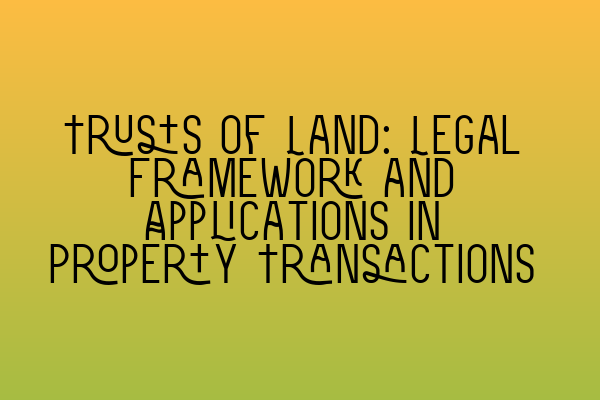Trusts of Land: Legal Framework and Applications in Property Transactions
Welcome to another informative blog post from SQE Property Law & Land Law. In this article, we will delve into the legal framework surrounding Trusts of Land and their applications in property transactions. Whether you are a solicitor, aspiring lawyer, or simply interested in property law, this guide will provide you with valuable insights into this area of practice.
What are Trusts of Land?
Trusts of Land, as the name suggests, pertain to the legal arrangement whereby one party (the trustee) holds legal ownership of land or property on behalf of another (the beneficiary). This arrangement allows for the separation of legal and beneficial interests in land, offering various benefits and flexibility in property transactions.
The Legal Framework of Trusts of Land
Trusts of Land are primarily governed by the Law of Property Act 1925 (LPA 1925). This legislation provides the legal basis for the creation and management of trusts, including Trusts of Land. Section 53(1)(b) of the LPA 1925 specifically recognizes trusts of land and allows for the legal transfer of land to be held on trust.
In addition to the LPA 1925, other legislation such as the Trusts of Land and Appointment of Trustees Act 1996 (TOLATA 1996) and the Land Registration Act 2002 also play a crucial role in the legal framework surrounding Trusts of Land. These acts provide further guidance on the rights, duties, and responsibilities of trustees and beneficiaries.
Applications of Trusts of Land in Property Transactions
Trusts of Land offer a wide range of applications in property transactions, providing flexibility and protection for both trustees and beneficiaries. Here are some common scenarios where Trusts of Land may be utilized:
1. Co-ownership: Trusts of Land are commonly used when multiple individuals own a property together. By establishing a trust, the legal and beneficial interests can be clearly defined, avoiding disputes and ensuring each party’s rights are protected.
2. Family Home: Trusts of Land are often utilized in family scenarios where one party contributes to the purchase of a property, but the legal ownership is held by another. For example, a parent may purchase a property in their name, but the beneficial interest is held for the benefit of their child.
3. Investment Properties: Trusts of Land are also prevalent in property investment scenarios. Investors may choose to hold legal ownership of a property on behalf of a trust, allowing for effective management and distribution of rental income and capital gains.
4. Charity Property: Charitable organizations frequently hold property assets in Trusts of Land. This allows for the efficient administration and management of such assets in line with the charity’s objectives.
5. Land Development: Trusts of Land can be instrumental in land development projects. They allow for the division of legal and beneficial interests, enabling multiple parties to invest in a development while maintaining control and ensuring compliance with planning regulations.
Conclusion
Trusts of Land play a vital role in property transactions, providing a legal framework that offers flexibility, protection, and efficient management of property assets. Whether it’s co-ownership, family homes, investment properties, charity assets, or land development, trusts can be tailored to suit various scenarios and objectives.
If you are studying for the SQE exams and need additional resources and practice questions, be sure to check out our SQE 1 Practice Exam Questions and SQE 1 Practice Mocks FLK1 FLK2 articles. We also offer comprehensive preparation courses for both SQE 1 and SQE 2 exams to help you succeed in your legal career. Don’t forget to stay updated with SRA SQE Exam Dates for important deadlines and exam schedules.
For further information and expert guidance on Trusts of Land and other property law matters, contact SQE Property Law & Land Law today. Our team of experienced solicitors is here to assist you with all your legal needs.
